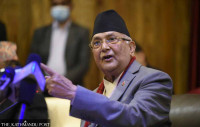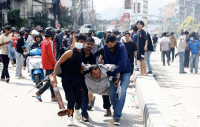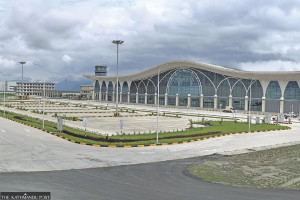Opinion
Challenging Darwin
Dikchhya Chapagain’s crusade to help the disadvantaged illustrates that it is not only the fittest who need to survive
Jagadish C. Baral
Three years ago, Dikchhya received a call from Gongabu. They suspected that a baby had been been thrown into the garbage. She rushed to the site urgently on her scooter, forgetting to even don a helmet. The police, surrounded by a great many people, were guarding a mysterious sack from which clearly protruded baby fingers. With police consent, Dikchhya approached the bag and carefully opened it. Inside, she discovered a pale infant, almost suffocating in the rubbish. After completing all the administrative formalities, Dikchhya drove the baby back to her Ashram where she became the 25th member.
Another case came from Humla in the remote north west. A deaf mother had given birth to a baby girl whose father was unidentified. Dikchhya brought the baby to the Ashram, where she has been ever since. Yet another case came from Taplejung, from where she rescued two little girls whose mother had died dead and father could not afford to keep them.To date, Dikchhya has rescued over four dozen people, infants and otherwise, and kept them safe until their family members could be identified. Her Ashram currently shelters 36 people, of whom 24 are children and the rest are the elderly and the handicapped. Twenty-three of the children (six boys and 17 girls) go to school nearby.
Dikchhya’s voyage
Anyone visiting the PSA can get a clear sense of Dikchhya’s commitment. She originally hails from Taplejung. After her School Leaving Certificate examinations, her parents proposed to marry her off to a local boy. She refused, apparently because she was passionate about something else. With the little money she had received as a prize from her school for having secured the highest marks inthe SLC, she left for Kathmandu all by herself. She was drawn to computers and spent the next two years completing her computer diploma. When she realised the value of computing and its potential, she was inclined to open a computer institute targeting the poor. Soon she was teaching computer classes to the disabled and widows for free.
But quickly, she realised that there were more urgent humanitarian affairs to attend to. This had triggered inside of her when she saw a nearly handicapped lad foraging for food in a heap of garbage near Sorakhutte. The scene touched her so much that she stopped to approach the boy. She cried openly while hugging him. Dikchhya took the boy in and he lived with her until he tragically passed away a few weeks later. This proved to be a turning point for Dikchhya who had promised herself that she would not marry. She thought that the world already had enough children who needed support and having her own seemed pointless. She began gathering together abandoned children and the elderly. When the number of children grew, she had no choice but to open up a formal organisation, which is now the PSA. The Ashram was initially located in Maharajgung and later moved to Dhapasi. Here, she makes use of a three-room shelter that belongs to the Tilingtar School.
Problems arise
Dikchhya has been amazed to note that there are a lot of benevolent hands who want to support her. People have been donating food, clothing, utensils and stationery. This is all thanks to the internet, which has been instrumental in connecting her with a host of people both from inside and outside the country. A paradox, however, prevails. She, for example, might be running out of washing soap whereas people donate chocolates.Still, she has many dues. She is currently faced with a housing crunch. She would like to bring all the helpless people she finds to her Ashram. Rainy and chilly nights in particular haunt her sleep as she thinks of how many people are spending the night under open skies. But the three rooms that she currently has are nowhere enough to accommodate everyone.
Worse, the Tilingtar School, which shares its compound with the Ashram, does not want to renew the contract with her fearing that ‘indecent’ people will be hanging around. They want to evict her by all means necessary, for which they have not even refrained from harassing Dikchhya. This ranges from verbal abuse to padlocking the kitchen just before dining, leaving hungry people languishing.
Turning around Darwin
But Dikchhya’s sorrows often temporarily subside when she witnesses how her small wards dream big. To cite a few examples: Ankita Nepal, a sixth grader, aspires to be Miss World while Abhisekh Nepal, also a sixth grader, wants to be a scientist. Dikchhya feels better when the small children hug her and plead with her to not leave them alone.
Now, Dikchhya has acquired a piece of land to construct a small dream home where she can keep her rescued mates. Thanks to a benign engineer, who was kind enough to draw up a design. But she lacks the financial means to bring her dream to fruition.
Darwinism may be the ultimate reality of this world but it need not be easily digested by people who value human life. If Dikchhya succeeds in garnering support for her cause, perhaps we can waive off Darwinism, even for a little while. Good luck,Dikchhya!
Baral is a former Joint Secretary




 8.12°C Kathmandu
8.12°C Kathmandu










